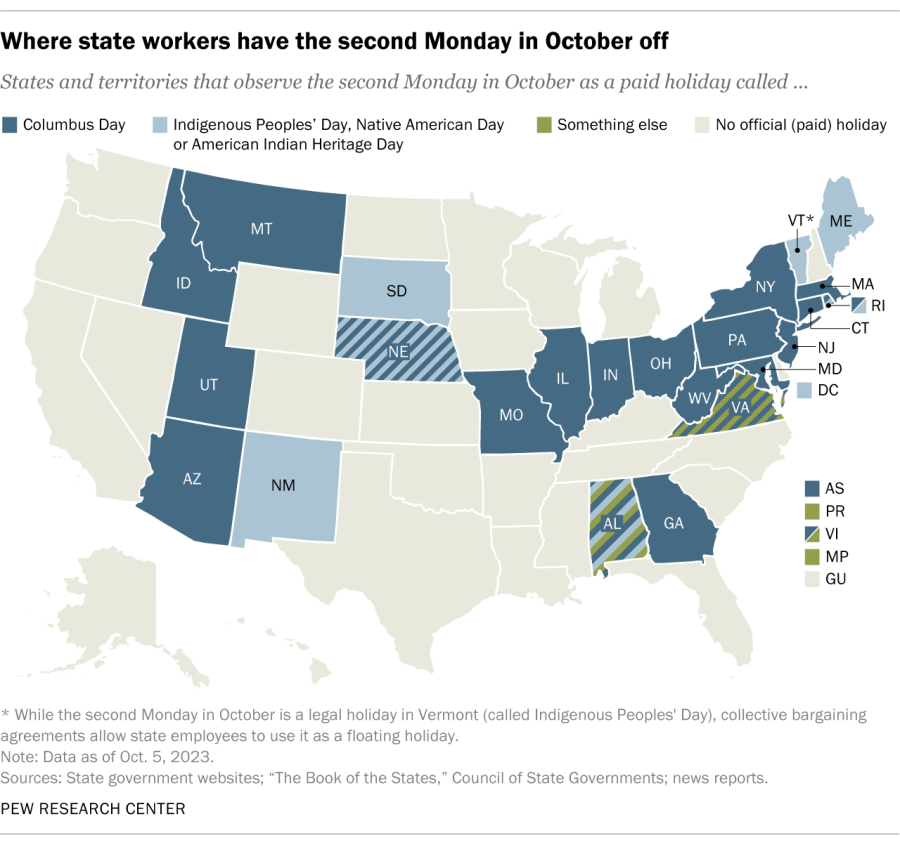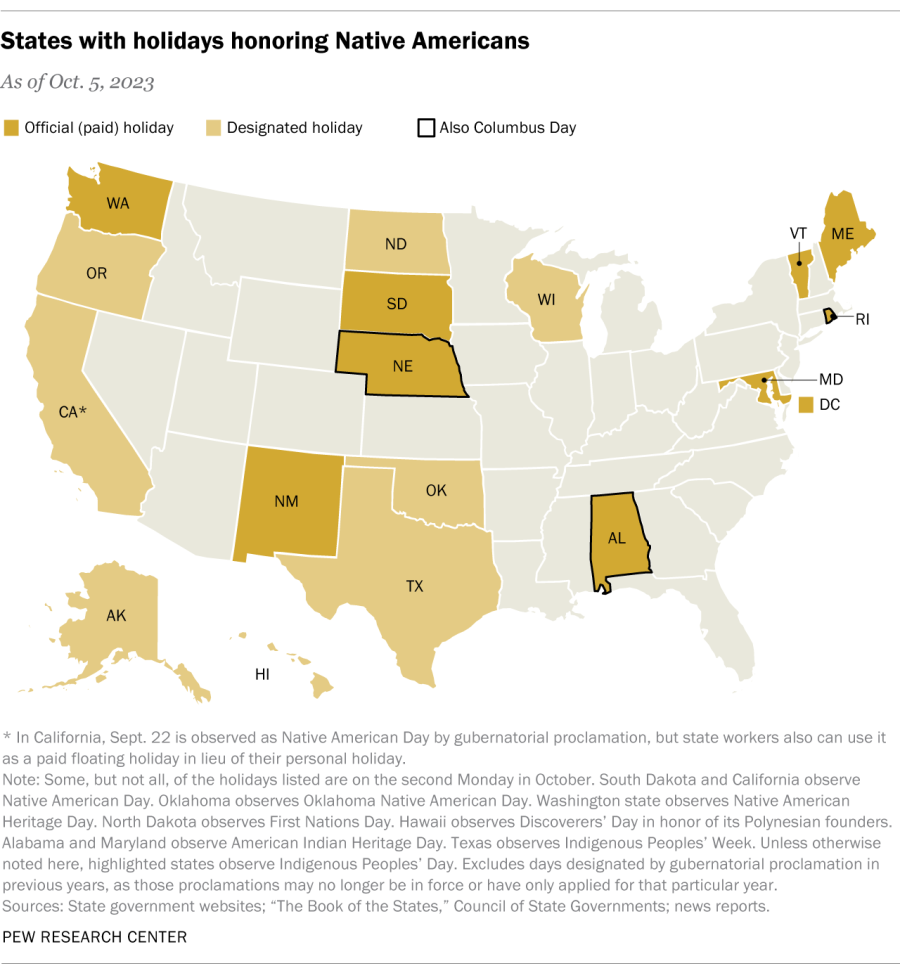From Alcatraz Island to a park in New York City, Native American people will celebrate their centuries-long history of resilience on Monday with ceremonies, dances and speeches.
The events across the U.S. come three years after President Joe Biden officially commemorated Indigenous Peoples Day. An increasing number of states and cities have also recognized it — pivoting from a day long rooted in the celebration of explorer Christopher Columbus to one focused on the people whose lives and culture were forever changed by colonialism.
“This day is about reclaiming histories,” said Kyle Mays, an associate professor of American Indian Studies at the University of California, Los Angeles. “It's acknowledging the history of dispossession and violence against Indigenous people.”
Here is a look at why it's called Indigenous Peoples Day, the history behind it and how people celebrate.
Get top local stories in Southern California delivered to you every morning. >Sign up for NBC LA's News Headlines newsletter.
Why is it called Indigenous Peoples Day?
Indigenous Peoples Day has been recognized for decades in different forms and under a variety of names to celebrate Native Americans' history and culture and to recognize the challenges they continue to face.
In 2021, Biden issued the first-ever presidential proclamation of Indigenous Peoples Day. He said in a statement that the day is meant to “honor America’s first inhabitants and the Tribal Nations that continue to thrive today.”
It is typically observed on the second Monday in October, the same day as Columbus Day, a federal holiday established decades ago to recognize Columbus’ sighting in 1492 of what came to be known as the Americas.
“Columbus was a lost explorer who stumbled into this part of the world and brought famine, colonization, the deaths of millions of Indigenous peoples," said Nick Tilsen, president and CEO of the NDN Collective, an Indigenous-led advocacy group. “For this country to celebrate that history is absolutely disrespectful.”
Is Indigenous Peoples Day a federal holiday?
Although it is not a federal holiday, 17 states — including California, Texas and Maine — as well as Washington, D.C., have holidays honoring Native Americans, some of which are on the second Monday in October, according to the Pew Research Center. Indigenous Peoples Day is typically paired with Columbus Day or replaces the federal holiday altogether. Dozens of cities and school systems observe Indigenous Peoples Day as well.
Earlier this year, Anchorage and Phoenix became two of the latest municipalities to officially designate Indigenous Peoples Day a holiday. And on Monday, several U.S. lawmakers announced they had reintroduced legislation meant to replace Columbus Day with Indigenous Peoples Day as a federal holiday.

What is the significance of Indigenous Peoples Day?
Its significance for Native Americans has more to do with the fact that it's the day the U.S. has celebrated Columbus, explained Cliff Matias, cultural director for the New York-based Redhawk Indigenous Arts Council.
“We celebrate our survival of Columbus and all that he brought,” he said.
Matias, whose Indigenous Nations are Taino and Kichwa, said a more suitable day to honor Native people would be the "summer solstice, which is a powerful day for Indigenous people all over the world. It might be some sort of day that we recognize generally correlating with our connection to the planet.”
Still, Tilsen said celebrating on this day is powerful.
“When we celebrate Indigenous Peoples Day in place of Columbus Day, it shows a victory for Indigenous people," he said. “It represents how we won’t be erased, how we still stand in our power, no matter what they did to try to kill us off and steal our land.”
How do people celebrate Indigenous Peoples Day?
Indigenous Peoples Day is meant to recognize the painful history Indigenous people have faced and to celebrate their communities, said Tilsen, who is Oglala Lakota. But it is also “a day of protest and resistance,” he said.
The day is often marked by protests against memorials to Columbus, for environmental justice, for the return of Indigenous lands and in honor of missing and murdered Indigenous women. Tilsen said he often participates in protests a day before celebrating with Native food, performances, art, music and traditional ceremonies.
Recognition of the day itself follows organizing by Indigenous peoples since the 1970s, said Mays, who is Black and Saginaw Anishinaabe. Activists say the effort to replace Columbus Day with Indigenous Peoples Day has been resisted by people who view Columbus as a representative of Italian-American history.
Tilsen said the issue “is not an either-or.”
“Italian-Americans have made so many contributions to America, and that should be celebrated," he said. “But not like this. There is so much more in Italian-American history that should be celebrated instead.”

Are banks and the post office closed on Indigenous Peoples Day?
Because Columbus Day is a federal holiday, government employees get a paid day off and there’s no mail delivery. And since federal offices will be closed, so will most banks and the bond markets that trade in U.S. government debt. The stock markets will remain open, however, as will most retailers and other businesses.
What are some of the events taking place this year?
Many Native Americans across the U.S. will come together for Indigenous Peoples Day to celebrate their history and culture and acknowledge the ongoing challenges they face with a focus on the election.
From a voting rally in Minneapolis featuring food, games and raffles to a public talk about the Native vote at Virginia Tech, the holiday, which comes about three weeks before Election Day, will feature a wide array of events geared toward Native voter mobilization and outreach amid a strong recognition of the power of their votes.
Janeen Comenote, executive director of the National Urban Indian Family Coalition, which is involved with at least a dozen of these types of voting events across the country, said this year it’s especially important to mobilize Native voters because the country is selecting the president. But she cautioned that Native people are in no way a monolith in terms of how they vote.
“We’re really all about just getting Native voters out to vote, not telling them how to vote. But sort of understanding that you have a voice and you’re a democracy, a democracy that we helped create,” said Comenote, a citizen of the Quinault Indian Nation.
In Arizona, her coalition is partnering with the Phoenix Indian Center to hold a town hall Monday called “Democracy Is Indigenous: Power Of The Native Vote,” which will feature speakers and performances, along with Indigenous artwork centered on democracy.
In Apex, North Carolina, about 14 miles (23 kilometers) southwest of Raleigh, the coalition is working with the Triangle Native American Society for an event expected to include a celebration of the 100th anniversary of the Indian Citizenship Act of 1924 and a booth with nonpartisan voter information and giveaways.
For people wanting to celebrate Indigenous Peoples Day, Tilsen said they should look out for community events and learn more about the Indigenous communities in their areas.
___
Associated Press writer Anita Snow in Phoenix contributed to this report.



